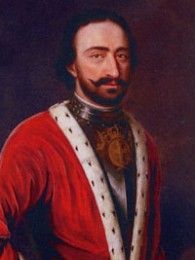Alexander Batonishvili (Imeretinski)

Alexander Batonishvili (Bagrationi) was the son of Archil II.
Alexander Batonishvili (Bagrationi) (Imeretinski) (1674, Tbilisi, 20. 02. – 1711 Piteå), was military and public figure, writer, and son of the King Archil II. He headed a new Georgian settlement in Moscow and was Russian Army's first Gen.- Feldzeugmeister (1700).
He received education at the royal court. In 1684, on an invitation from the Russian monarch, he and his brother Mamuka went to Moscow with N. Jorjadze.
He mastered the Russian language and literature, foreign languages, and military customs; and successfully promoted cultural and agricultural activities of Georgian settlement. In 1697, together with Peter I's "Grand Envoys," he traveled to Europe. In Hague, he improved his knowledge of the art of warfare, he lived in Amsterdam for a short period and then went to England. By the end of 1699, he returned to Moscow.
During the war with Sweden in 1700, he was captured during the Battle of Narva and spent 10 years in Sweden as a captive.
Upon returning to Moscow, he spearheaded (together with his father) various activities involving literature and translation. In the 90s of the 17th century, from Moscow, he sent to Georgia icons, prints of the portraits of saints, and an old Slavic-to-Georgian translated handwritten book "Prolog-Synaxarion". During his visit with the "Grand Envoys" to Europe in Amsterdam, he met with the renowned orientalist N. Witsen and provided him with materials on various Georgian regions and languages. He also helped him write the Georgian lexicon.
In Stockholm, Alexander Batonishvili continued working on Georgian fonts with his family friend, scholar, and diplomat J.G. Sparwenfeldt. The latter previously had Georgian hallmarks made by Hungarian specialist M. Kish. Alexander Batonishvili also independently had small Georgian hallmarks made and sent them to Russia. Several Georgian-language prayers were printed in Sweden with these fonts.
In 1706, under the pretense that Alexander needed a personal confessor, Archil (his father) sent his son a well-known translator and ancient Greek language scholar, Bagratois Mtatsmindeli (Sologhashvili). The latter brought with him Georgian books, icons, and Davitiani, the first Georgian book printed in Moscow. He also translated from Russian to Georgian "Praises to the Lord Jesus Christ," (National Center of Manuscripts, Fond A-347).
Among the important works of Alexander Batonishvili is his book on the art of artillery. It was later used as a manual.
After the defeat of King Charles XII of Sweden at Poltava, in 1711, Alexander Batonishvili, along with other Russian generals, was allowed to return to their homeland, however, Alexander died on the way.
He is buried in the Donskoy Monastery in Russia.
Literature: გონიკიშვილი მ., ბაგრატიონთა დასახლება და მოღვაწეობა რუსეთში, თბ., 1986: სიხარულიძე ფ., მასალები საქართველო-შვედეთის ურთიერთობის ისტორიისათვის, კრ.: მეგობრობა, ტ. 2, თბ., 1981; Пали Х., Между двумя боями за нарву, Таллин, 1966; Хмыров М., Первый генерал-Фельдцейхмейстер царевич Имеретинский, «Артиллерийский журнал», 1865, № 1; Эсадзе Б., Фельдцейхмейстер русской артиллерии царевич Александр Арчилович, Тфл., 1913; Aspelin e., Elias Brenner, Helsingfors, 1896; Jacobovskij C. V., J. G. Sparwenfeldt, Stocкholm, 1932.
P. Sikharulidze


